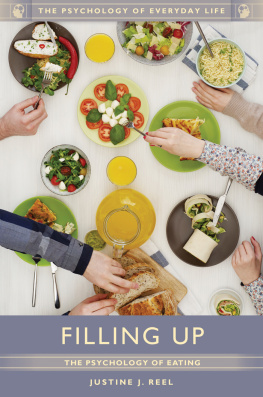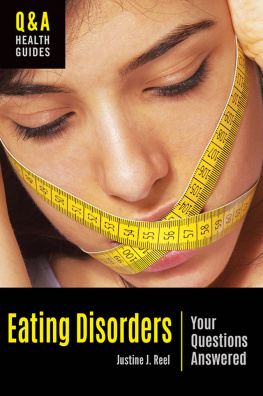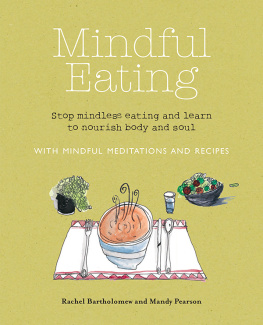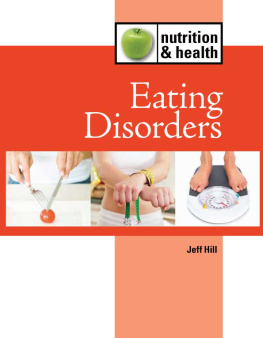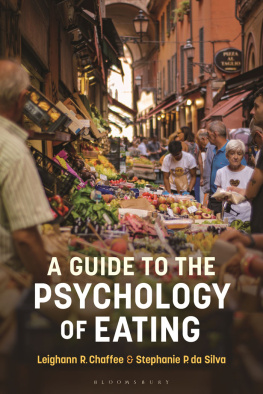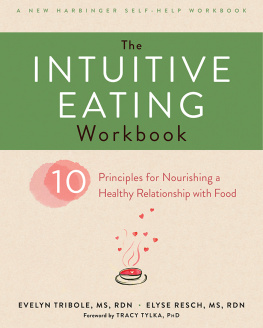Recent Titles in The Psychology of Everyday Life
Working Out: The Psychology of Sport and Exercise
Justine J. Reel
Chilling Out: The Psychology of Relaxation
Christine L. B. Selby
Hooking Up: The Psychology of Sex and Dating
Katherine M. Helm
F ILLING U P

The Psychology of Eating
Justine J. Reel
The Psychology of Everyday Life

Copyright 2017 by ABC-CLIO, LLC
All rights reserved. No part of this publication may be reproduced, stored in a retrieval system, or transmitted, in any form or by any means, electronic, mechanical, photocopying, recording, or otherwise, except for the inclusion of brief quotations in a review, without prior permission in writing from the publisher.
Library of Congress Cataloging-in-Publication Data
Names: Reel, Justine J.
Title: Filling up : the psychology of eating / Justine J. Reel.
Description: Santa Barbara, California : Greenwood, an imprint of ABC-CLIO, LLC, [2017] | Series: The psychology of everyday life | Includes bibliographical references and index.
Identifiers: LCCN 2016024339 (print) | LCCN 2016039805 (ebook) | ISBN 9781440840890 (hardcopy : alk. paper) | ISBN 9781440840906 (ebook)
Subjects: LCSH: Eating disordersPsychological aspects. | Eating disordersSocial aspects.
Classification: LCC RC552.E18 R433 2017 (print) | LCC RC552.E18 (ebook) | DDC 616.85/26dc23
LC record available at https://lccn.loc.gov/2016024339
ISBN: 9781440840890
EISBN: 9781440840906
21 20 19 18 171 2 3 4 5
This book is also available as an eBook.
Greenwood
An Imprint of ABC-CLIO, LLC
ABC-CLIO, LLC
130 Cremona Drive, P.O. Box 1911
Santa Barbara, California 93116-1911
www.abc-clio.com
This book is printed on acid-free paper 
Manufactured in the United States of America
This book is dedicated to my loving husband for his unconditional support over all these years. His passion for food coupled with his cooking talents has given me the opportunity to practice the act of mindful and intuitive eating. You had me at chicken parmigiana!
Contents
Series Foreword
Psychology is the science of behavior; it is the field that examines how and why people do, feel, and think the things that they do. However, in a very real way, everyone is a psychologist. Each of us observes and tries to understand the thoughts, feelings, and behaviors of people we are around, as well as trying to understand ourselves. Have you ever thought, I wonder why she did that? Or perhaps, Why did I do that; it makes no sense. If you have, then you are asking psychological questions. Most people enjoy being students of human behavior and observing and thinking about people, human nature, and all of the variants of the human condition. The difference between most people and psychologists is that the psychologist has spent many years in school studying and learning about people.
In addition to studying and doing research, psychologists also work directly with people in many settings. For example, clinical and counseling psychologists work with people who are dealing with psychological disorders or are having problems in their lives that require professional assistance, but there are many other branches of psychology as well. Sport psychologists work with athletes and teams to improve performance and team functioning. Industrial/organizational psychologists help workers, managers, and organizations function more effectively and efficiently. Military psychologists deal with military personnel and organizations. Forensic psychologists work with police and other law enforcement organizations to help solve crimes and assist law enforcement personnel. In addition to all of the things that psychologists know about people, for any person, understanding psychology can help take advantage of what psychologists have learned to help all people live better and healthier lives and to deal more effectively with others.
The Psychology of Everyday Life is a series of books that will address many different and important psychological issues and areas, the goal being to provide information and examples of how psychology touches all of our lives on a daily basis. The series will also show ways in which psychological knowledge can help us. These books will address psychological concerns with the most up-to-date and relevant knowledge from the field of psychology. Information from the laboratories, classrooms, clinics, hospitals, and other settings will be brought together to help make sense out of some important and often complex ideas. However, these books will be directed toward readers who are not psychologists, but are interested in learning more about the field and what it has to offer. Thus, the language is not technical but is common language addressing regular people. There will be times when professional and technical language may be used, but only if thoroughly explained and related to the issues being discussed.
This series of books will focus on specific facets of our daily lives and show how psychology can help us understand and deal with these issues. A wide range of topics will be covered, from eating to exercising to relaxing to interpersonal conflict. Each book will consist of three distinct parts. will answer the who/what/where/when/why/how questions related to the topic. These chapters will examine everything from how the subject manifests in our day-to-day lives and how it impacts our psychological well-being to differences across the life span and cultures to what famous psychologists have to say on the subject.
Part II in each book will focus on real-life examples and will address many of the issues that were introduced in each book in they will begin to see many of the ways in which our daily lives are touched by psychology, and the many ways that psychology can be used to support and help people.
Part III in each book will address the controversial issues related to the books subject. Like any academic and professional discipline, psychology has many areas where there are spirited disagreements among academics, practitioners, and researchers about important issues in the field. It will be very instructive for people to understand these issues and to see the careful and systematic ways that scholars think about and conceptualize various topics, and to see how they debate, discuss, and resolve some of their differences of opinion. For non-psychologists, these controversial issues and how they are addressed will lead to a greater understanding of psychological matters, but also a better grasp of how scientists and professionals deal with differences and controversies and how these disagreements are addressed.
Psychology is a broad and diverse field with many different approaches, theories, methods, and ideas, and to capture this field in its breadth and depth would be impossible in a single book. This series of books, however, will serve as an introductory journey through psychology as it relates to the daily lives of ordinary people. I have been teaching, studying, and practicing psychology for many decades and I can hardly wait to read each of the books in this very exciting series, and I welcome readers to take this journey with me.

